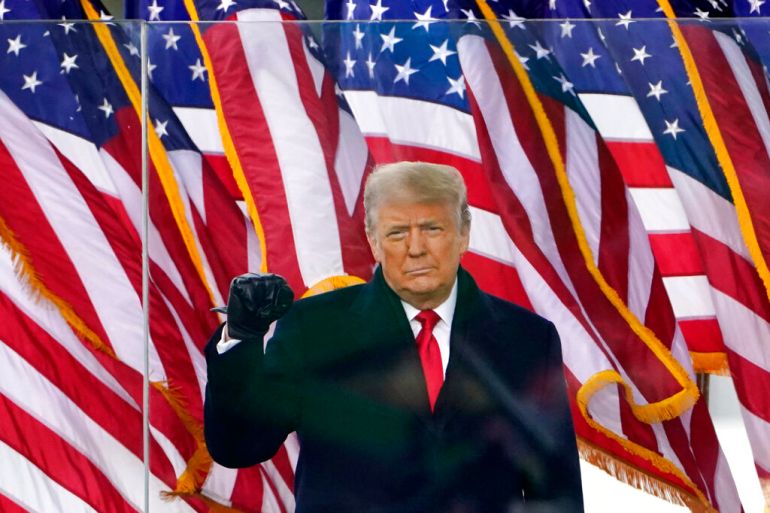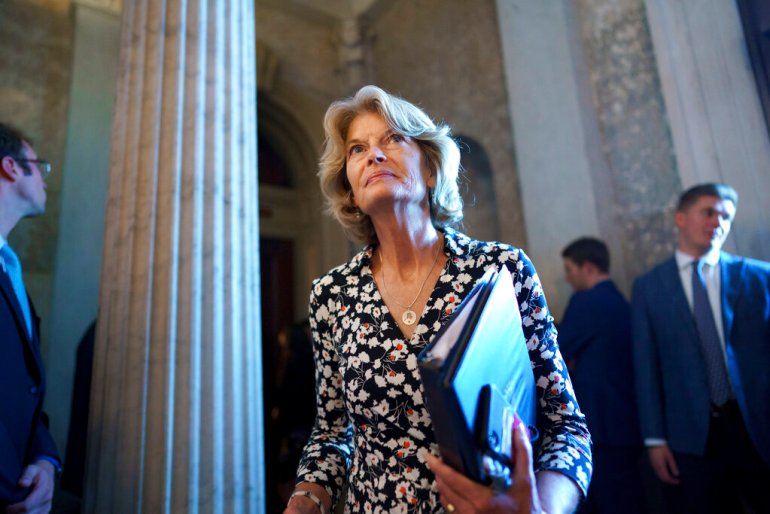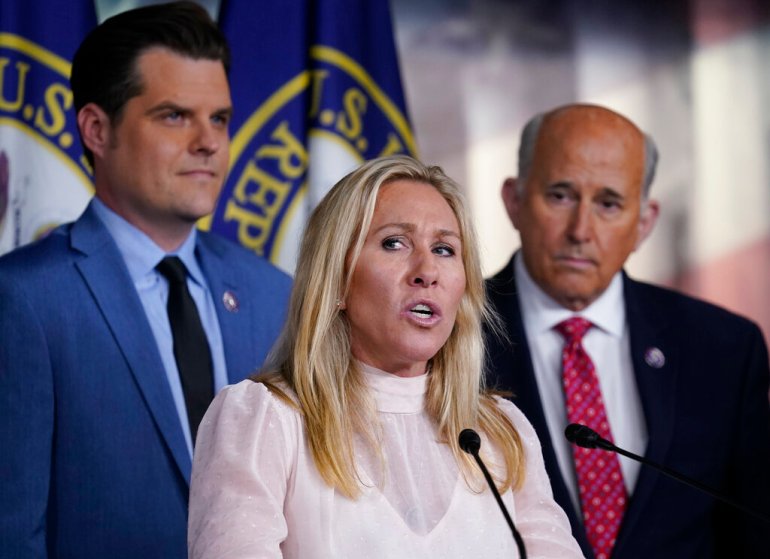After January 6, Trump’s hold on US Republicans persists
Despite widespread criticism after deadly Capitol riot, analysts say former US president remains dominant voice in GOP.

Washington, DC – Former United States President Donald Trump’s hold on the Republican Party has only tightened since he left office, despite the storm of controversy and widespread criticism he faced in the aftermath of last year’s riot at the Capitol.
Part of the reason for his continued dominance, explained David Schultz, a professor of politics at Hamline University in Saint Paul, Minnesota, is that Trump remains a “charismatic” figure who appeals to the passions of Republican voters.
Keep reading
list of 4 itemsEx-US President Donald Trump announces social media site
Donald Trump’s farewell falsehoods: Fact check
What is the effect of Donald Trump’s second impeachment?
“Trump has been very successful capturing people through fear, through prejudice, through emotions,” Schultz told Al Jazeera. “The Republican Party is Trump now. Without Trump, I don’t think there is a Republican Party.”
Whether Trump’s outsized influence will last is an open question. Near-term political trends are in his favour, but continuing investigations into his role in the January 6 insurrection and ongoing legal troubles related to his New York real estate business pose risks.
‘Incitement of insurrection’
Trump has continued to deny he played a role in the riot, despite being impeached by the US House of Representatives for “incitement of insurrection”, and to advance false claims that the outcome of the 2020 election he lost to President Joe Biden was rigged.
A mob of his supporters stormed the building after the Republican leader gave an incendiary speech near the White House during which he urged the crowd to “fight like hell” and “stop the steal”.
Trump has also tried to block a US House of Representatives committee investigating the events of January 6 from accessing White House documents linked to the riot, accusing the lawmakers involved in the probe of a cover-up.
While that may hurt Trump with the wider majority of Americans who believe January 6 was an attempt to subvert the 2020 election, it is helping to motivate Republican voters who buy what the ex-president is selling.
“Trump has formidable support among the population,” Matthew Dickinson, a professor of politics at Middlebury College in Vermont, told Al Jazeera.
“Donald Trump is the best-known Republican politician and so, whether you like him or hate him – and I frankly think most of the Republican establishment [doesn’t] like him – your electoral fortunes are tied to the ability of Donald Trump to mobilise voters on your behalf.”
Political influence
Trump is keeping open the prospect of a 2024 comeback bid for the White House and he is actively supporting Republican candidates in the upcoming midterm elections. Trump so far has endorsed roughly 85 Republican candidates for public office, including some challengers to incumbent Republicans with whom Trump has broken away from.
In Georgia, a key state Trump lost in 2020, the former president has recruited and backed a team of political candidates to run in the next election that includes former American football star Herschel Walker and former Senator David Purdue.
Indeed, Trump’s endorsements can make or break a candidate. His backing of Purdue against Republican Governor Brian Kemp has given Purdue a boost and hurt Kemp, according to Charles Bullock, a political science professor at the University of Georgia.
“He has convinced Republican officeholders that his blessing is important to their political futures and his damnation is fatal,” Bullock told Al Jazeera.

In Arizona, Trump is planning to hold a political rally on January 15 to support former local news anchor Kari Lake for governor. Lake has said she believes Trump, not Biden, won the 2020 election in Arizona, even though three state audits showed Biden won.
“I’m honored to have President Trump’s endorsement. And I’m thrilled that he’s coming to Florence, Arizona, January 15 for his first rally of 2022. Let’s make this his biggest rally yet. I will see you there!” Lake tweeted on January 2.
In Alaska, a state Trump won twice, he has endorsed Kelly Tshibaka, a Republican state official who is challenging incumbent Senator Lisa Murkowski, one of seven Republican senators who voted to impeach Trump for the January 6 insurrection.
Trump endorsed Alaska Governor Mike Dunleavy on condition Dunleavy would not endorse Murkowski. “If Mike endorses her, which is his prerogative, my endorsement of him is null and void, and of no further force or effect!” Trump said in a statement.

Midterm elections
To be sure, Trump’s ongoing sway in the Republican Party, and his future political prospects, will be tested in the upcoming November elections. His past track record of wins and losses in endorsements has been checkered, although Republicans are poised to do well this year.
Some Republicans fear bruising intra-party fights in the Republican primaries over re-litigating Trump’s grievances could risk losses to Democrats in the general election.
In Georgia, Trump sparked infighting among Republicans by prompting Purdue – who lost his Senate re-election bid last year – to run against incumbent Republican Kemp. Kemp had angered Trump when he certified Biden’s 2020 election win in Georgia.
Nationally, the Alaska contest pits Trump against the Senate Republican leader Mitch McConnell, who supports Murkowski.

But another part of what keeps Trump relevant is the bitter partisanship that currently dominates American politics, which analysts say is a function of the gerrymandering of congressional districts that has sidelined moderate voices in both parties.
While a few Republicans have rejected Trump’s narrative, including Representative Adam Kinzinger, who voted for Trump’s impeachment but will not seek re-election in the midterms, most have fallen in line with Trump.
Meanwhile, a group of outspoken House members, including Representatives Jim Jordan, Marjorie Taylor Greene, Matt Gaetz, and Paul Gosar, have emerged as the leading cheerleaders for his message in Congress.
“Trump has always appealed to the right-wing base of the Republican Party and he has managed to capture it,” Thomas Volgy, a professor in the School of Government and Public Policy at The University of Arizona, told Al Jazeera.
“When you take the gerrymandering, the identity politics, the punishment of people who speak a different tone in your own political party … it makes it very difficult for people to move away.”